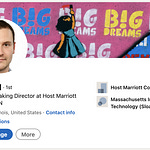I want to thank you for all the kind words and responses to the last edition of Greg's Newsletter, which included some thoughts on last week's winter weather disaster here in Texas.
And also hi to all the new subscribers! Check out the archive here and to everybody: if you like this newsletter, tell a friend!
OK, Fine, Let's Talk Clubhouse (and Dispo)
Few social platforms have ratcheted up the hype, buzz, and big-name participants that Clubhouse has. Last week, it just got its first big New York Times writeup which, as we all know, means that Clubhouse is no longer cool.
But first, for the uninitiated, what is Clubhouse? It's an audio-only social media platform, launched last year, that lets users gather in audio chatrooms. In these "rooms," as they're called, you might find some moderators, guest panelists, and then an audience listening in. Sometimes moderators will let audience members raise their hands and they'll be allowed to participate in the conversation.
The conversations are all over the map, subject matter-wise. If you have an interest or a passion, odds are you can find groups and rooms that will be right up your alley.
It's still invite-only and iOS-only, so right off the bat, it was purposefully built on exclusivity and even elitism (invite-only is normal for a new social app in testing; still invite-only almost a year after launch, with several million users, is very purposeful). And a lot of the conversations, especially those that end up garnering media coverage, reflect that. There is very much an annoying, out-of-touch (with reality) Silicon Valley bro vibe within. But, also, Clubhouse has become very popular with Black users, who have found ways to innovate on the platform. There's a lot of good and a lot of bad. It's messy.
I'm genuinely excited about the social audio space, which I started writing about in 2019. I did a deep dive on the social audio app TTYL and wrote the following—replace "friends" and "family" with "creators" and "interesting people," and this a lot of the concepts at play relate Clubhouse.
There's so much downtime during a day, when we have earphones in. But we don't know who of our friends or family might be available to chat without having a predetermined time to talk, texting/messaging to see if someone's available, or cold calling. This app removes that friction.
And then unlike a video chat/Facetime or group video chat, the barriers to start a conversation are super low. Especially if you're out-and-about, knowing that you've got three friends available, it's easy to just start a conversation. Nobody's going to be shy or think "eh, I don't want to turn the camera on, I'm not up for this." It just works.
And while I'm bullish on social audio, I haven't been enamored with Clubhouse the way a lot of folks in my industry and online are, for a few reasons:
It's rife with people with "hustle/entrepreneur/marketing" bios which, in practice, leads to a lot of conversations with people just wanting to hear their own voices and make their own points. But whatever. That's going to happen on new apps and platforms.
The platform was built without clear community guidelines in place, including how to address harassment and moderation. They've started to—mainly after negative media coverage—but what worries me is that they're scaling first and thinking about the ramifications later. Clubhouse may be repeating the wildly detrimental mistakes that other social platforms have. And when I say detrimental, I mean detrimental to society, to democracy, and to people. If inclusivity, safety, anti-harassment, and moderation mechanisms aren't built in from the very beginning, I fear that we're going to have the same conversations about [insert hyped platform] that we've been having about Facebook and Twitter.
Again, I think social audio is going to be really important. It's just about the only communication medium that hasn't had a true social media enhancement and my hope is that platform founders genuinely learn from platform mistakes of the past. I just want social audio to be done the right way, and I don't know if Clubhouse is it. That's not to say it won't be successful—it truly looks like it's on its way to being this year's TikTok. But at what cost? And why do we have to keep asking that question of social media?
OK, here's one social media thing that I am kind of excited about and I can't believe I'm about to type this, but: there's a new social app built by influencer David Dobrik and his team, that acts as a disposable camera (you take photos, but they don't "develop" until the next morning) and a collaborative photo album (you add photos to your personal or group "rolls"). It's called Dispo.
I've genuinely been excited to wake up these past couple mornings to see how my photos from the previous day turned out. And there's something happy and satisfying about adding a photo of our weekend sushi to a roll called "weekend vibes" that's curated by people I don't even know. But there is something deeper at work, with how the app works (find me @gregb if you're on).
It takes time. Literal time. You don't take photo-after-photo, trying to capture the cleanest shot before you post to IG. You snap a photo or two and then you have to wait until morning! This is delayed gratification that's absolutely contra to standard social media instant gratification.
There is no feed, no algorithm dictating what you're seeing. The algorithmic social media feed is one of the most toxic things about social. It's designed to be addictive, so you're endlessly scrolling and refreshing. Dispo doesn't have that. You take your photos. They develop the next day. You add them to rolls. And then you can go explore and find other rolls and comment or hit the fire emoji (the equivalent of a like, but it appears to not just be aggregate likes, which is a good thing). There are rolls for all types of topics and interests.
Your profile does have a follower count, which is still a relic of toxic social media. We'll see how Dispo treats vanity metrics like that moving forward.
And also: Dispo is invite-only, ostensibly for testing purposes at this point (it's not yet available in the App Store). I hope Dispo doesn't take the Clubhouse approach of banking on exclusivity and elitism.
There seems to be genuine excitement for it by its current userbase and I have no idea if the app will scale. But dang: it's still a relatively toxic-free, delayed gratification experience that takes time, but doesn't take all of your time. And it's fun.
I hope we see more of these kinds of platforms pop up in the future.














Share this post